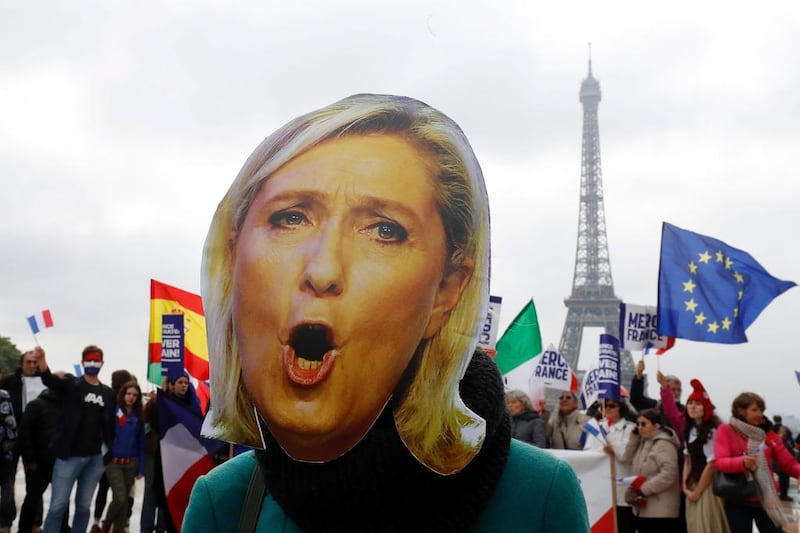PARIS // Marine Le Pen took her crushing defeat in France’s presidential election with trademark combativeness, saying her “historic” score confirmed her party’s status as France’s “biggest opposition force”.
But she announced plans to undertake “a profound transformation” of the Front National (FN) N and to continue the fight between “patriots and globalists” in June’s parliamentary elections.
More than 10 million people voted for her – up from 7.6 million in the first round – testifying to her efforts to de-demonise her party by purging it of overt anti-Semitism and racism.
The 48-year-old anti-EU, anti-immigration “candidate of the people” took just under 34 per cent of the vote. It was double what her father Jean-Marie Le Pen managed in the 2002 election but fell far short of forecasts – and the expectations of many activists.
“With terrorism, unemployment and Trump, the environment was so favourable, so favourable,” said Jean-Francois Touze, who was a senior Front National (FN) official when Ms Le Pen’s father was party leader. “It’s a total failure.”
The battle for parliamentary seats next month will maintain party discipline. The party has just two members in the current parliament and a poll by OpinionWay last week projected that it will get no more than 25 seats in the 577-strong chamber this time around.
Afterwards, however, there will be a reckoning. Already dissidents looking ahead to a party conference later this year are questioning Ms Le Pen’s decision to campaign against the EU and the euro rather than on the usual themes of immigration and security.
“The stakes are high,” said Jean-Yves Camus, a political scientist specialising in far-right politics. “She can’t afford to do too badly in the legislative elections after losing the presidential vote.”
The lack of obvious successors may mean Ms Le Pen’s position is not in immediate danger, but the risk for her is that she will be forced by the party’s old guard – people like Mr Touze – to return to a more traditional platform.
He said that after a “truce” for the parliamentary election, the party will have to hold a conference to decide both on its policy programme and its leadership.
The only other figure with a profile to compare with Ms Le Pen is her niece, Marion Marechal-Le Pen. Though she is a member of the National Assembly, at 27 she is deemed to be not ready for the leadership.
No excuses for Florian Philippot, her closest aide, however. He helped Ms Le Pen airbrush the FN’s racist image. Issues of “nationalism” became issues of “sovereignty”. He was the architect of Ms Le Pen’s plan to pull France out of the eurozone, which ultimately proved to be a turn-off for many voters.
“Making the euro exit a priority was the wrong option, and it’s probably a key to the defeat,” said Joel Jadot, a 70-year-old party member from northern France. “Changes will have to be made, that’s unavoidable. We must shift back to the national identity, fighting terrorism, and security. She will have little choice about that.”
A trained lawyer who ironically started out defending illegal immigrants facing deportation, Ms Le Pen tried to rebrand the FN as a “party of patriots” after taking the helm in 2011. Any FN member caught making anti-Semitic statements was out. In 2015 she kicked her own father out of the party. They have not spoken since. Unsurprisingly, his verdict on her campaign performance was withering. “She lacked stature,” he said.
During the campaign she studiously avoided using her tainted family name, and swapped the FN’s trademark flame logo for a blue rose, using the slogan “Choose France”.
She tried to tap into the populist revolt that sparked Brexit and brought Mr Trump to power. In January, she attended a rally in Koblenz, Germany with fellow extremists Geert Wilders and Germany’s Frauke Petry where she predicted a backlash that would sweep through the heart of Europe.
“This the end of a world and the rise of a new one,” she said. In the end, Mr Wilders was beaten in the Dutch election in March and Ms Petry was pushed out by her own Alternative for Germany party in April as it trailed 20 percentage points behind Germany’s two main parties.
But the anti-Semitism and revisionism that once defined the FN were never far from the surface. As well as questioning France’s role in the Holocaust she is also being investigated for tweeting pictures of ISIL atrocities.
Ms Le Pen developed a tough shell after a tumultuous childhood. When she was eight, a bomb ripped through the Paris apartment building where the family lived, slightly injuring six people but sparing the Le Pens.
Eight years later, her mother Pierrette walked out on her husband and three daughters, sensationally resurfacing shortly afterwards posing nude in Playboy magazine. Marine did not see her mother for 15 years.
Now herself a twice-divorced mother of three, she keeps her private life out of the spotlight.
For now, the FN is not expected to make her pay for Sunday’s defeat. But in one of her last campaign speeches she vowed that whatever the result, she would not keep quiet.
* Bloomberg and Agence France-Presse





